Mandated Reporters of Child Abuse
VerifiedAdded on 2022/09/06
|13
|3177
|23
AI Summary
Contribute Materials
Your contribution can guide someone’s learning journey. Share your
documents today.
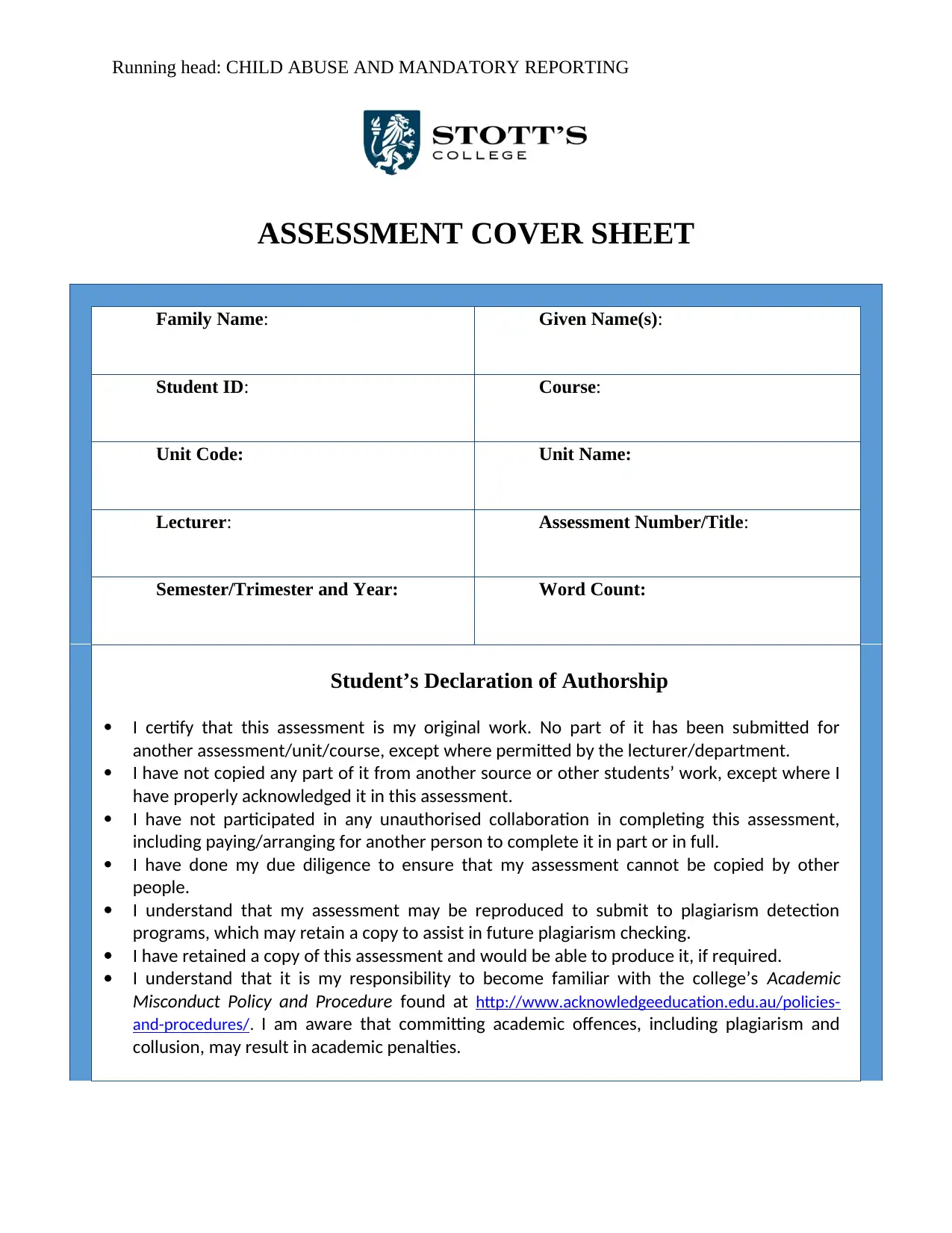
Running head: CHILD ABUSE AND MANDATORY REPORTING
ASSESSMENT COVER SHEET
Family Name: Given Name(s):
Student ID: Course:
Unit Code: Unit Name:
Lecturer: Assessment Number/Title:
Semester/Trimester and Year: Word Count:
Student’s Declaration of Authorship
I certify that this assessment is my original work. No part of it has been submitted for
another assessment/unit/course, except where permitted by the lecturer/department.
I have not copied any part of it from another source or other students’ work, except where I
have properly acknowledged it in this assessment.
I have not participated in any unauthorised collaboration in completing this assessment,
including paying/arranging for another person to complete it in part or in full.
I have done my due diligence to ensure that my assessment cannot be copied by other
people.
I understand that my assessment may be reproduced to submit to plagiarism detection
programs, which may retain a copy to assist in future plagiarism checking.
I have retained a copy of this assessment and would be able to produce it, if required.
I understand that it is my responsibility to become familiar with the college’s Academic
Misconduct Policy and Procedure found at http://www.acknowledgeeducation.edu.au/policies-
and-procedures/. I am aware that committing academic offences, including plagiarism and
collusion, may result in academic penalties.
ASSESSMENT COVER SHEET
Family Name: Given Name(s):
Student ID: Course:
Unit Code: Unit Name:
Lecturer: Assessment Number/Title:
Semester/Trimester and Year: Word Count:
Student’s Declaration of Authorship
I certify that this assessment is my original work. No part of it has been submitted for
another assessment/unit/course, except where permitted by the lecturer/department.
I have not copied any part of it from another source or other students’ work, except where I
have properly acknowledged it in this assessment.
I have not participated in any unauthorised collaboration in completing this assessment,
including paying/arranging for another person to complete it in part or in full.
I have done my due diligence to ensure that my assessment cannot be copied by other
people.
I understand that my assessment may be reproduced to submit to plagiarism detection
programs, which may retain a copy to assist in future plagiarism checking.
I have retained a copy of this assessment and would be able to produce it, if required.
I understand that it is my responsibility to become familiar with the college’s Academic
Misconduct Policy and Procedure found at http://www.acknowledgeeducation.edu.au/policies-
and-procedures/. I am aware that committing academic offences, including plagiarism and
collusion, may result in academic penalties.
Secure Best Marks with AI Grader
Need help grading? Try our AI Grader for instant feedback on your assignments.
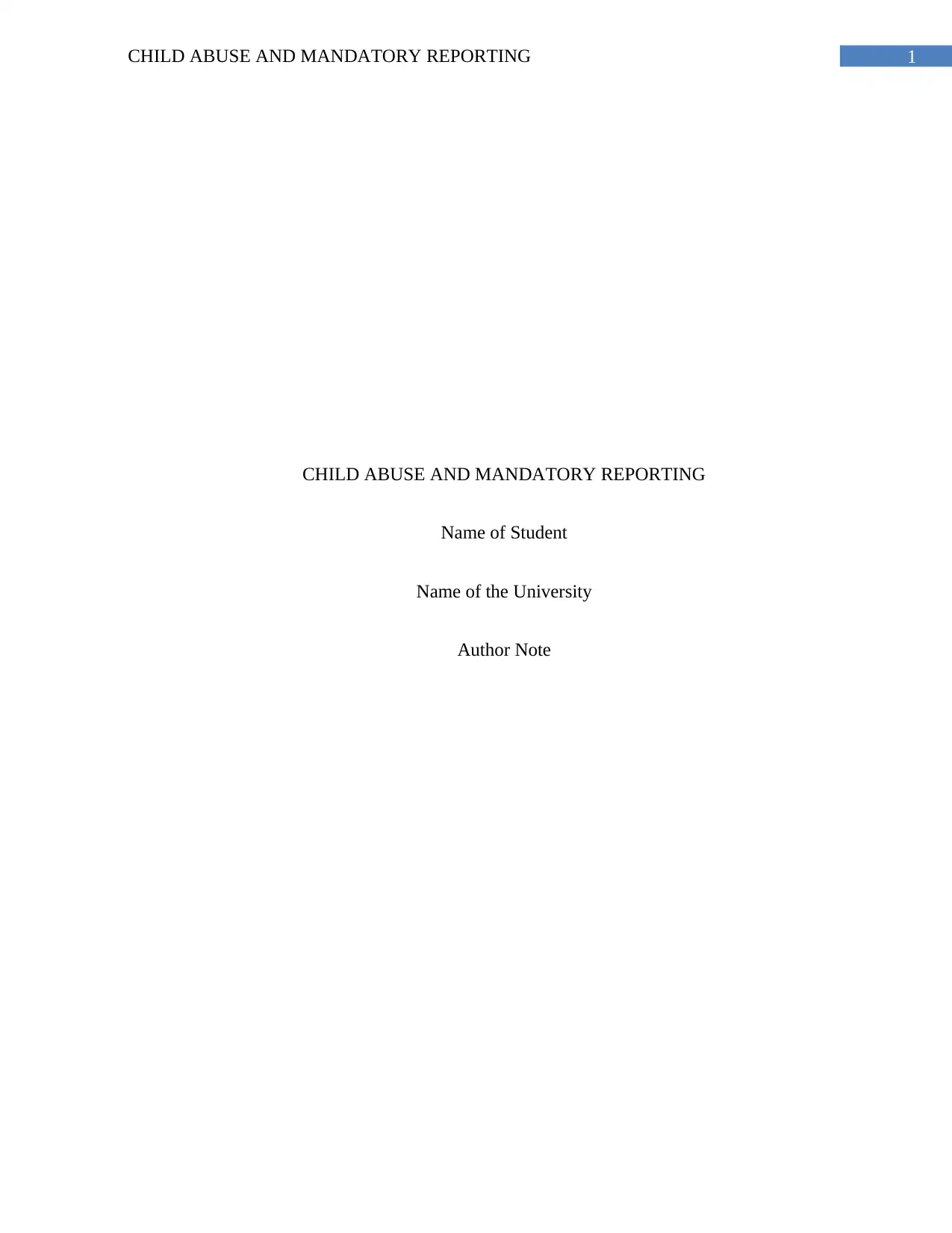
1CHILD ABUSE AND MANDATORY REPORTING
CHILD ABUSE AND MANDATORY REPORTING
Name of Student
Name of the University
Author Note
CHILD ABUSE AND MANDATORY REPORTING
Name of Student
Name of the University
Author Note
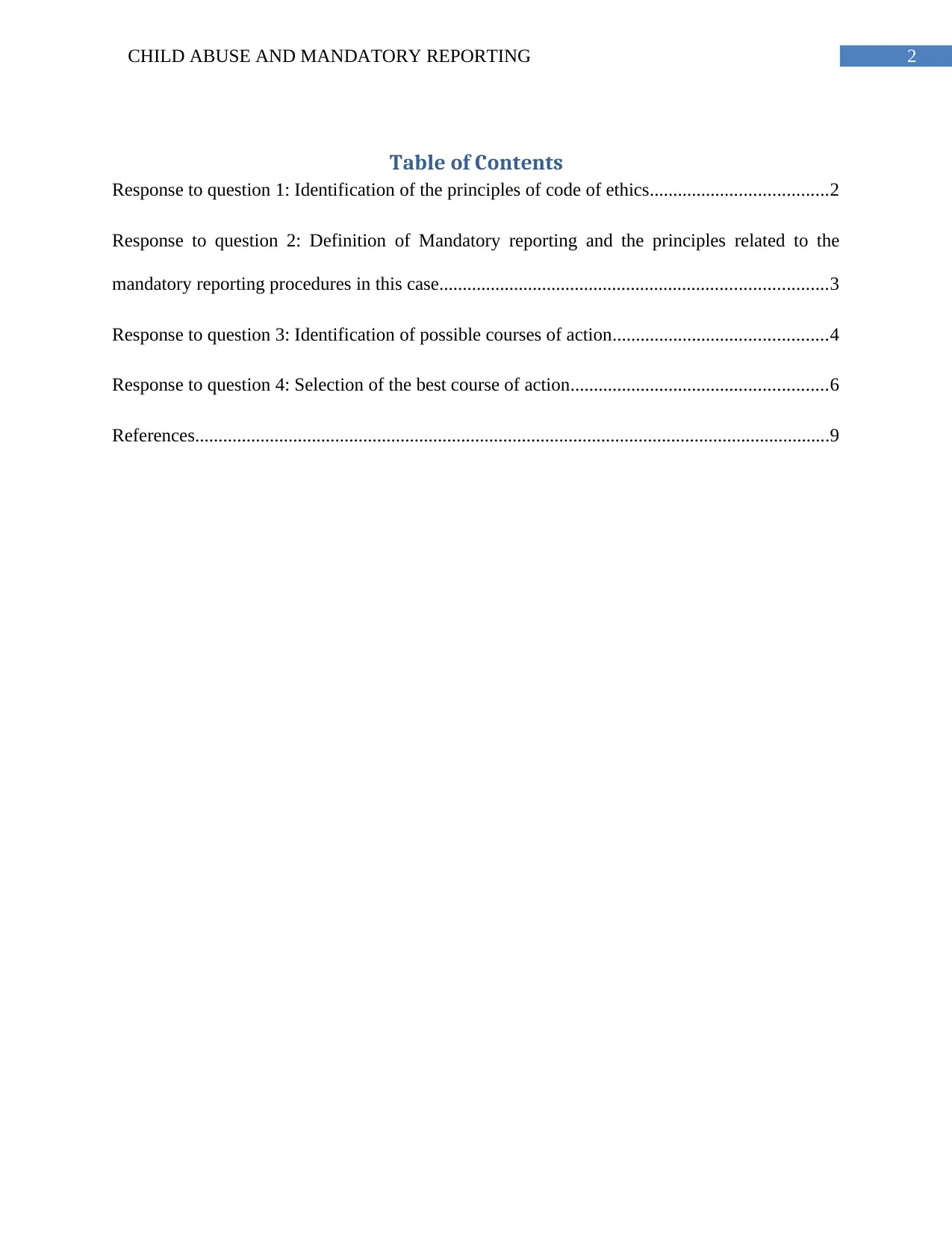
2CHILD ABUSE AND MANDATORY REPORTING
Table of Contents
Response to question 1: Identification of the principles of code of ethics......................................2
Response to question 2: Definition of Mandatory reporting and the principles related to the
mandatory reporting procedures in this case...................................................................................3
Response to question 3: Identification of possible courses of action..............................................4
Response to question 4: Selection of the best course of action.......................................................6
References........................................................................................................................................9
Table of Contents
Response to question 1: Identification of the principles of code of ethics......................................2
Response to question 2: Definition of Mandatory reporting and the principles related to the
mandatory reporting procedures in this case...................................................................................3
Response to question 3: Identification of possible courses of action..............................................4
Response to question 4: Selection of the best course of action.......................................................6
References........................................................................................................................................9
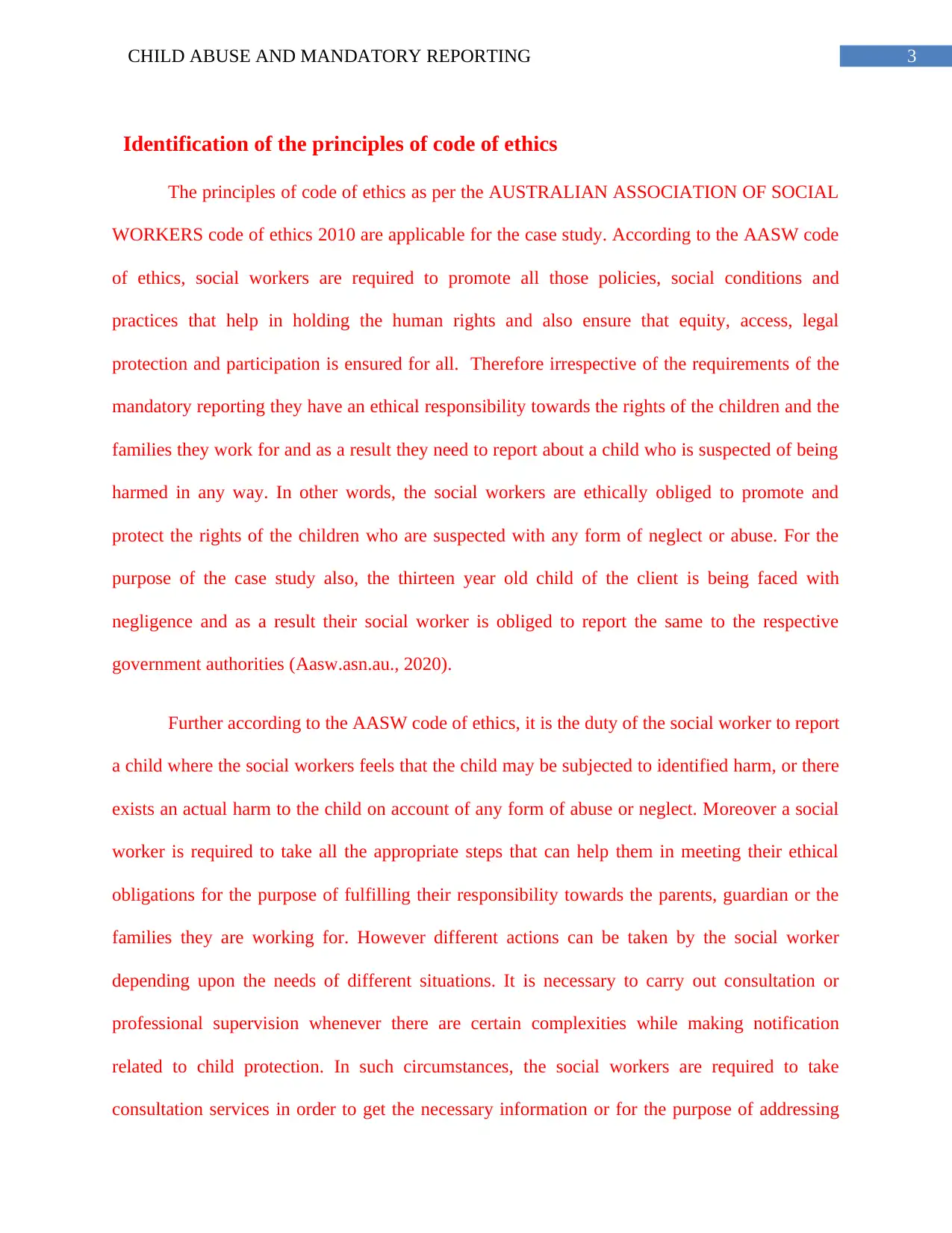
3CHILD ABUSE AND MANDATORY REPORTING
Identification of the principles of code of ethics
The principles of code of ethics as per the AUSTRALIAN ASSOCIATION OF SOCIAL
WORKERS code of ethics 2010 are applicable for the case study. According to the AASW code
of ethics, social workers are required to promote all those policies, social conditions and
practices that help in holding the human rights and also ensure that equity, access, legal
protection and participation is ensured for all. Therefore irrespective of the requirements of the
mandatory reporting they have an ethical responsibility towards the rights of the children and the
families they work for and as a result they need to report about a child who is suspected of being
harmed in any way. In other words, the social workers are ethically obliged to promote and
protect the rights of the children who are suspected with any form of neglect or abuse. For the
purpose of the case study also, the thirteen year old child of the client is being faced with
negligence and as a result their social worker is obliged to report the same to the respective
government authorities (Aasw.asn.au., 2020).
Further according to the AASW code of ethics, it is the duty of the social worker to report
a child where the social workers feels that the child may be subjected to identified harm, or there
exists an actual harm to the child on account of any form of abuse or neglect. Moreover a social
worker is required to take all the appropriate steps that can help them in meeting their ethical
obligations for the purpose of fulfilling their responsibility towards the parents, guardian or the
families they are working for. However different actions can be taken by the social worker
depending upon the needs of different situations. It is necessary to carry out consultation or
professional supervision whenever there are certain complexities while making notification
related to child protection. In such circumstances, the social workers are required to take
consultation services in order to get the necessary information or for the purpose of addressing
Identification of the principles of code of ethics
The principles of code of ethics as per the AUSTRALIAN ASSOCIATION OF SOCIAL
WORKERS code of ethics 2010 are applicable for the case study. According to the AASW code
of ethics, social workers are required to promote all those policies, social conditions and
practices that help in holding the human rights and also ensure that equity, access, legal
protection and participation is ensured for all. Therefore irrespective of the requirements of the
mandatory reporting they have an ethical responsibility towards the rights of the children and the
families they work for and as a result they need to report about a child who is suspected of being
harmed in any way. In other words, the social workers are ethically obliged to promote and
protect the rights of the children who are suspected with any form of neglect or abuse. For the
purpose of the case study also, the thirteen year old child of the client is being faced with
negligence and as a result their social worker is obliged to report the same to the respective
government authorities (Aasw.asn.au., 2020).
Further according to the AASW code of ethics, it is the duty of the social worker to report
a child where the social workers feels that the child may be subjected to identified harm, or there
exists an actual harm to the child on account of any form of abuse or neglect. Moreover a social
worker is required to take all the appropriate steps that can help them in meeting their ethical
obligations for the purpose of fulfilling their responsibility towards the parents, guardian or the
families they are working for. However different actions can be taken by the social worker
depending upon the needs of different situations. It is necessary to carry out consultation or
professional supervision whenever there are certain complexities while making notification
related to child protection. In such circumstances, the social workers are required to take
consultation services in order to get the necessary information or for the purpose of addressing
Secure Best Marks with AI Grader
Need help grading? Try our AI Grader for instant feedback on your assignments.
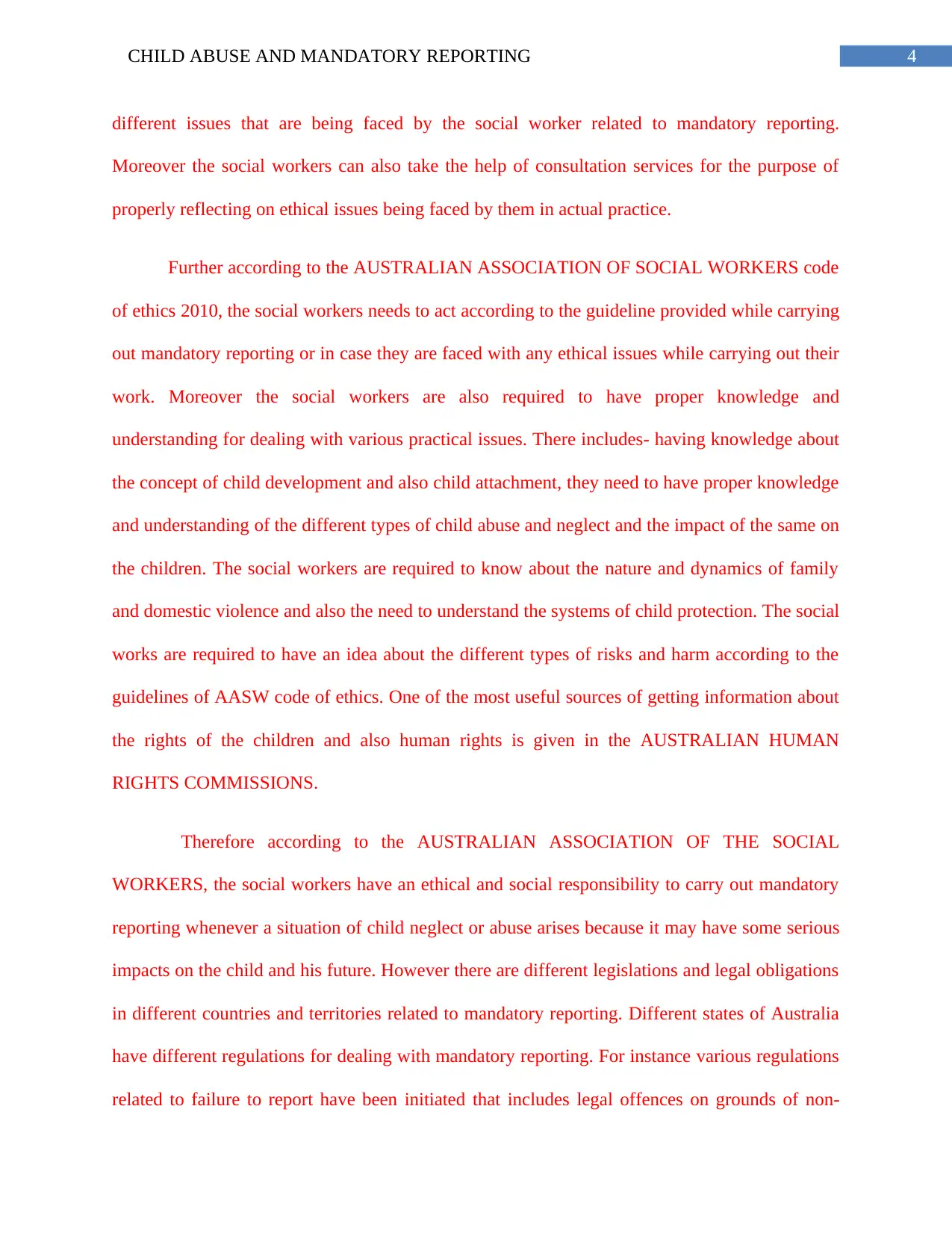
4CHILD ABUSE AND MANDATORY REPORTING
different issues that are being faced by the social worker related to mandatory reporting.
Moreover the social workers can also take the help of consultation services for the purpose of
properly reflecting on ethical issues being faced by them in actual practice.
Further according to the AUSTRALIAN ASSOCIATION OF SOCIAL WORKERS code
of ethics 2010, the social workers needs to act according to the guideline provided while carrying
out mandatory reporting or in case they are faced with any ethical issues while carrying out their
work. Moreover the social workers are also required to have proper knowledge and
understanding for dealing with various practical issues. There includes- having knowledge about
the concept of child development and also child attachment, they need to have proper knowledge
and understanding of the different types of child abuse and neglect and the impact of the same on
the children. The social workers are required to know about the nature and dynamics of family
and domestic violence and also the need to understand the systems of child protection. The social
works are required to have an idea about the different types of risks and harm according to the
guidelines of AASW code of ethics. One of the most useful sources of getting information about
the rights of the children and also human rights is given in the AUSTRALIAN HUMAN
RIGHTS COMMISSIONS.
Therefore according to the AUSTRALIAN ASSOCIATION OF THE SOCIAL
WORKERS, the social workers have an ethical and social responsibility to carry out mandatory
reporting whenever a situation of child neglect or abuse arises because it may have some serious
impacts on the child and his future. However there are different legislations and legal obligations
in different countries and territories related to mandatory reporting. Different states of Australia
have different regulations for dealing with mandatory reporting. For instance various regulations
related to failure to report have been initiated that includes legal offences on grounds of non-
different issues that are being faced by the social worker related to mandatory reporting.
Moreover the social workers can also take the help of consultation services for the purpose of
properly reflecting on ethical issues being faced by them in actual practice.
Further according to the AUSTRALIAN ASSOCIATION OF SOCIAL WORKERS code
of ethics 2010, the social workers needs to act according to the guideline provided while carrying
out mandatory reporting or in case they are faced with any ethical issues while carrying out their
work. Moreover the social workers are also required to have proper knowledge and
understanding for dealing with various practical issues. There includes- having knowledge about
the concept of child development and also child attachment, they need to have proper knowledge
and understanding of the different types of child abuse and neglect and the impact of the same on
the children. The social workers are required to know about the nature and dynamics of family
and domestic violence and also the need to understand the systems of child protection. The social
works are required to have an idea about the different types of risks and harm according to the
guidelines of AASW code of ethics. One of the most useful sources of getting information about
the rights of the children and also human rights is given in the AUSTRALIAN HUMAN
RIGHTS COMMISSIONS.
Therefore according to the AUSTRALIAN ASSOCIATION OF THE SOCIAL
WORKERS, the social workers have an ethical and social responsibility to carry out mandatory
reporting whenever a situation of child neglect or abuse arises because it may have some serious
impacts on the child and his future. However there are different legislations and legal obligations
in different countries and territories related to mandatory reporting. Different states of Australia
have different regulations for dealing with mandatory reporting. For instance various regulations
related to failure to report have been initiated that includes legal offences on grounds of non-
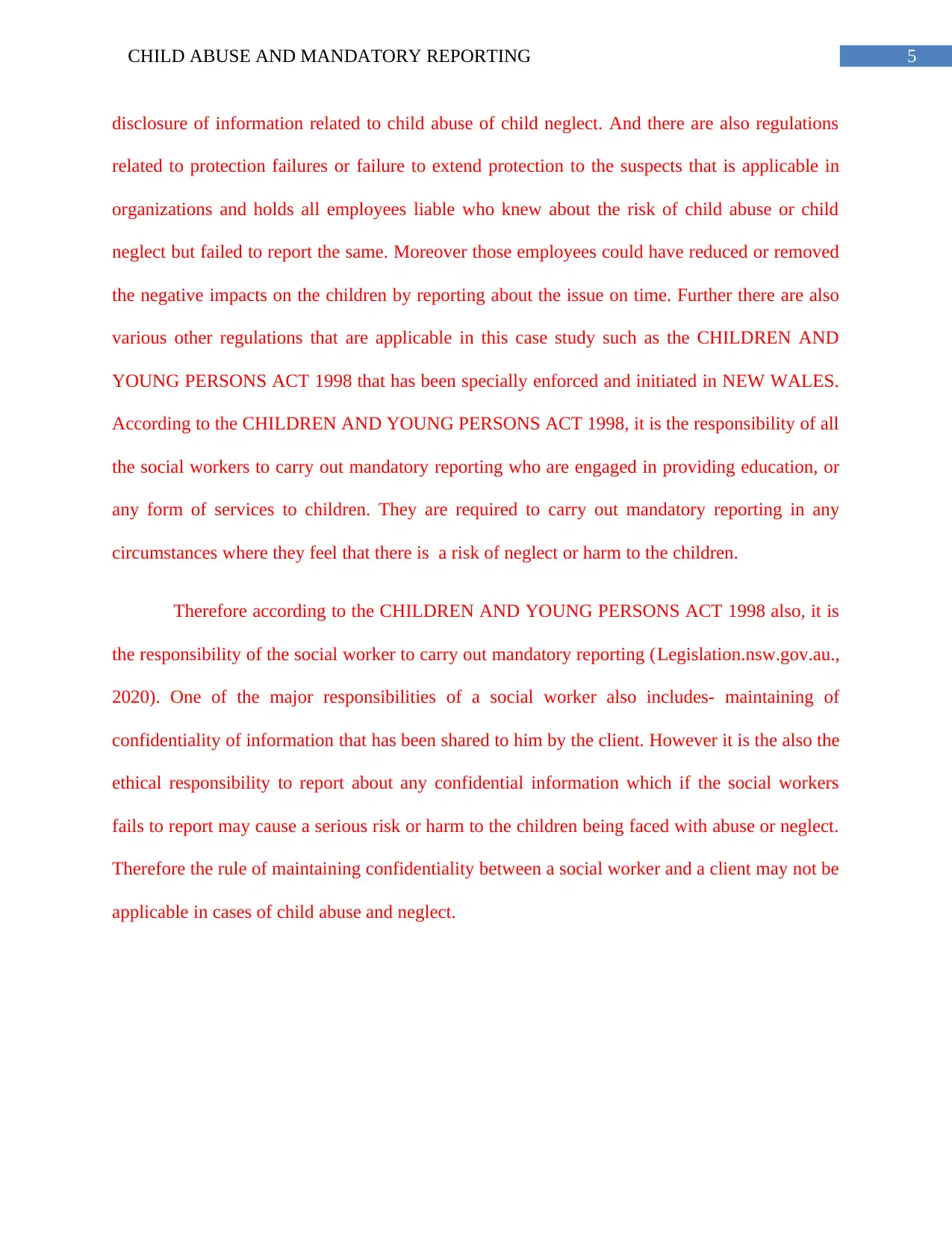
5CHILD ABUSE AND MANDATORY REPORTING
disclosure of information related to child abuse of child neglect. And there are also regulations
related to protection failures or failure to extend protection to the suspects that is applicable in
organizations and holds all employees liable who knew about the risk of child abuse or child
neglect but failed to report the same. Moreover those employees could have reduced or removed
the negative impacts on the children by reporting about the issue on time. Further there are also
various other regulations that are applicable in this case study such as the CHILDREN AND
YOUNG PERSONS ACT 1998 that has been specially enforced and initiated in NEW WALES.
According to the CHILDREN AND YOUNG PERSONS ACT 1998, it is the responsibility of all
the social workers to carry out mandatory reporting who are engaged in providing education, or
any form of services to children. They are required to carry out mandatory reporting in any
circumstances where they feel that there is a risk of neglect or harm to the children.
Therefore according to the CHILDREN AND YOUNG PERSONS ACT 1998 also, it is
the responsibility of the social worker to carry out mandatory reporting (Legislation.nsw.gov.au.,
2020). One of the major responsibilities of a social worker also includes- maintaining of
confidentiality of information that has been shared to him by the client. However it is the also the
ethical responsibility to report about any confidential information which if the social workers
fails to report may cause a serious risk or harm to the children being faced with abuse or neglect.
Therefore the rule of maintaining confidentiality between a social worker and a client may not be
applicable in cases of child abuse and neglect.
disclosure of information related to child abuse of child neglect. And there are also regulations
related to protection failures or failure to extend protection to the suspects that is applicable in
organizations and holds all employees liable who knew about the risk of child abuse or child
neglect but failed to report the same. Moreover those employees could have reduced or removed
the negative impacts on the children by reporting about the issue on time. Further there are also
various other regulations that are applicable in this case study such as the CHILDREN AND
YOUNG PERSONS ACT 1998 that has been specially enforced and initiated in NEW WALES.
According to the CHILDREN AND YOUNG PERSONS ACT 1998, it is the responsibility of all
the social workers to carry out mandatory reporting who are engaged in providing education, or
any form of services to children. They are required to carry out mandatory reporting in any
circumstances where they feel that there is a risk of neglect or harm to the children.
Therefore according to the CHILDREN AND YOUNG PERSONS ACT 1998 also, it is
the responsibility of the social worker to carry out mandatory reporting (Legislation.nsw.gov.au.,
2020). One of the major responsibilities of a social worker also includes- maintaining of
confidentiality of information that has been shared to him by the client. However it is the also the
ethical responsibility to report about any confidential information which if the social workers
fails to report may cause a serious risk or harm to the children being faced with abuse or neglect.
Therefore the rule of maintaining confidentiality between a social worker and a client may not be
applicable in cases of child abuse and neglect.
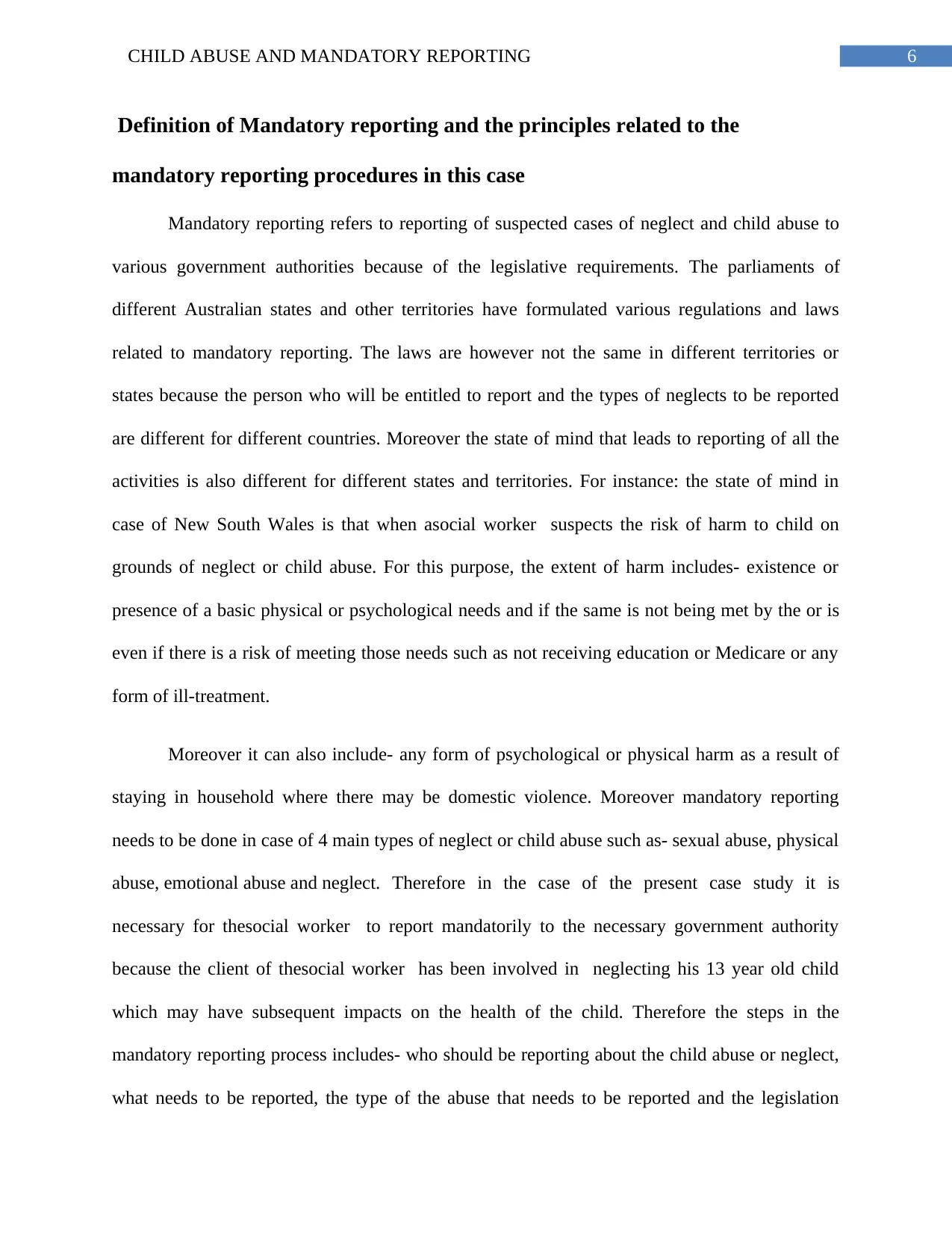
6CHILD ABUSE AND MANDATORY REPORTING
Definition of Mandatory reporting and the principles related to the
mandatory reporting procedures in this case
Mandatory reporting refers to reporting of suspected cases of neglect and child abuse to
various government authorities because of the legislative requirements. The parliaments of
different Australian states and other territories have formulated various regulations and laws
related to mandatory reporting. The laws are however not the same in different territories or
states because the person who will be entitled to report and the types of neglects to be reported
are different for different countries. Moreover the state of mind that leads to reporting of all the
activities is also different for different states and territories. For instance: the state of mind in
case of New South Wales is that when asocial worker suspects the risk of harm to child on
grounds of neglect or child abuse. For this purpose, the extent of harm includes- existence or
presence of a basic physical or psychological needs and if the same is not being met by the or is
even if there is a risk of meeting those needs such as not receiving education or Medicare or any
form of ill-treatment.
Moreover it can also include- any form of psychological or physical harm as a result of
staying in household where there may be domestic violence. Moreover mandatory reporting
needs to be done in case of 4 main types of neglect or child abuse such as- sexual abuse, physical
abuse, emotional abuse and neglect. Therefore in the case of the present case study it is
necessary for thesocial worker to report mandatorily to the necessary government authority
because the client of thesocial worker has been involved in neglecting his 13 year old child
which may have subsequent impacts on the health of the child. Therefore the steps in the
mandatory reporting process includes- who should be reporting about the child abuse or neglect,
what needs to be reported, the type of the abuse that needs to be reported and the legislation
Definition of Mandatory reporting and the principles related to the
mandatory reporting procedures in this case
Mandatory reporting refers to reporting of suspected cases of neglect and child abuse to
various government authorities because of the legislative requirements. The parliaments of
different Australian states and other territories have formulated various regulations and laws
related to mandatory reporting. The laws are however not the same in different territories or
states because the person who will be entitled to report and the types of neglects to be reported
are different for different countries. Moreover the state of mind that leads to reporting of all the
activities is also different for different states and territories. For instance: the state of mind in
case of New South Wales is that when asocial worker suspects the risk of harm to child on
grounds of neglect or child abuse. For this purpose, the extent of harm includes- existence or
presence of a basic physical or psychological needs and if the same is not being met by the or is
even if there is a risk of meeting those needs such as not receiving education or Medicare or any
form of ill-treatment.
Moreover it can also include- any form of psychological or physical harm as a result of
staying in household where there may be domestic violence. Moreover mandatory reporting
needs to be done in case of 4 main types of neglect or child abuse such as- sexual abuse, physical
abuse, emotional abuse and neglect. Therefore in the case of the present case study it is
necessary for thesocial worker to report mandatorily to the necessary government authority
because the client of thesocial worker has been involved in neglecting his 13 year old child
which may have subsequent impacts on the health of the child. Therefore the steps in the
mandatory reporting process includes- who should be reporting about the child abuse or neglect,
what needs to be reported, the type of the abuse that needs to be reported and the legislation
Paraphrase This Document
Need a fresh take? Get an instant paraphrase of this document with our AI Paraphraser
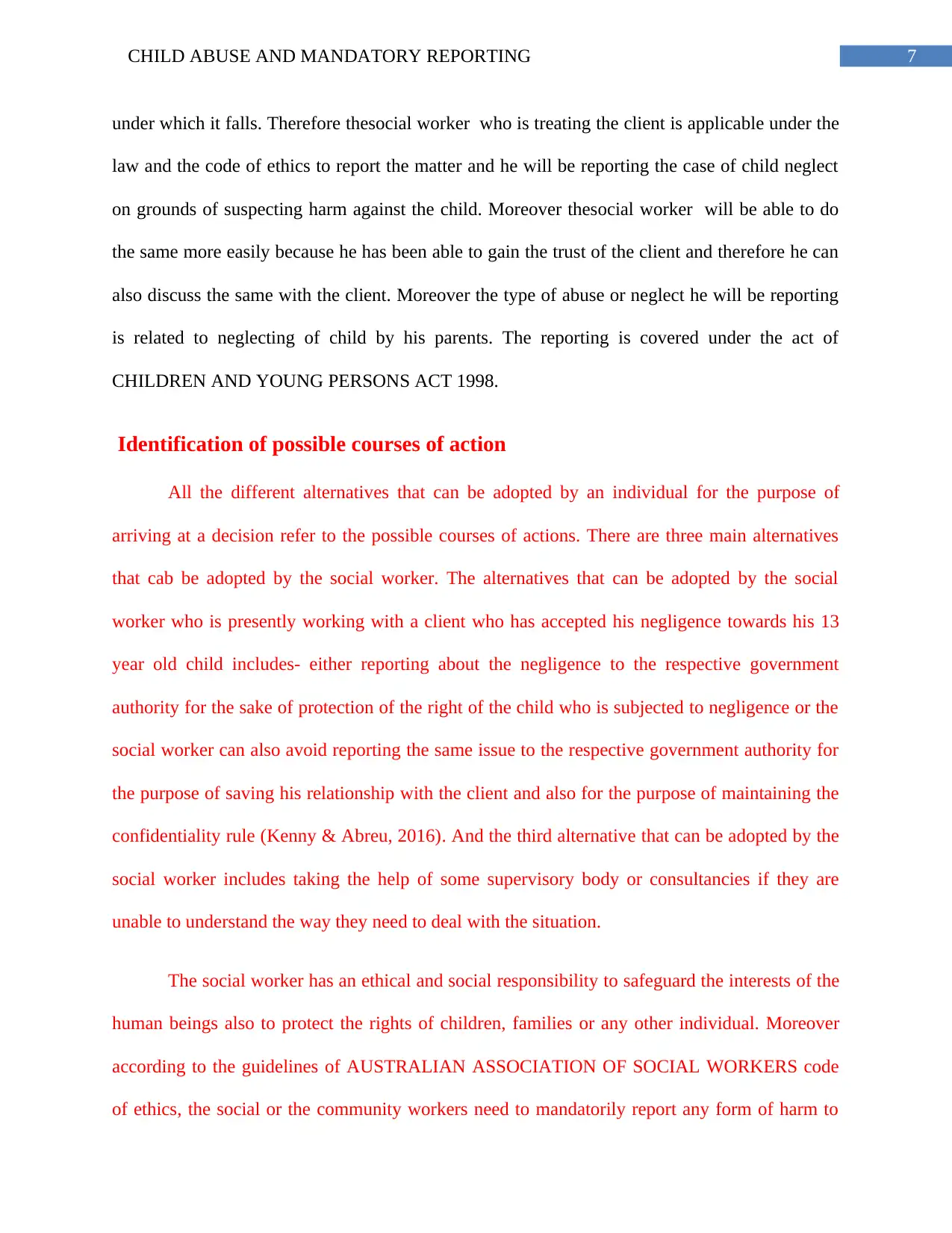
7CHILD ABUSE AND MANDATORY REPORTING
under which it falls. Therefore thesocial worker who is treating the client is applicable under the
law and the code of ethics to report the matter and he will be reporting the case of child neglect
on grounds of suspecting harm against the child. Moreover thesocial worker will be able to do
the same more easily because he has been able to gain the trust of the client and therefore he can
also discuss the same with the client. Moreover the type of abuse or neglect he will be reporting
is related to neglecting of child by his parents. The reporting is covered under the act of
CHILDREN AND YOUNG PERSONS ACT 1998.
Identification of possible courses of action
All the different alternatives that can be adopted by an individual for the purpose of
arriving at a decision refer to the possible courses of actions. There are three main alternatives
that cab be adopted by the social worker. The alternatives that can be adopted by the social
worker who is presently working with a client who has accepted his negligence towards his 13
year old child includes- either reporting about the negligence to the respective government
authority for the sake of protection of the right of the child who is subjected to negligence or the
social worker can also avoid reporting the same issue to the respective government authority for
the purpose of saving his relationship with the client and also for the purpose of maintaining the
confidentiality rule (Kenny & Abreu, 2016). And the third alternative that can be adopted by the
social worker includes taking the help of some supervisory body or consultancies if they are
unable to understand the way they need to deal with the situation.
The social worker has an ethical and social responsibility to safeguard the interests of the
human beings also to protect the rights of children, families or any other individual. Moreover
according to the guidelines of AUSTRALIAN ASSOCIATION OF SOCIAL WORKERS code
of ethics, the social or the community workers need to mandatorily report any form of harm to
under which it falls. Therefore thesocial worker who is treating the client is applicable under the
law and the code of ethics to report the matter and he will be reporting the case of child neglect
on grounds of suspecting harm against the child. Moreover thesocial worker will be able to do
the same more easily because he has been able to gain the trust of the client and therefore he can
also discuss the same with the client. Moreover the type of abuse or neglect he will be reporting
is related to neglecting of child by his parents. The reporting is covered under the act of
CHILDREN AND YOUNG PERSONS ACT 1998.
Identification of possible courses of action
All the different alternatives that can be adopted by an individual for the purpose of
arriving at a decision refer to the possible courses of actions. There are three main alternatives
that cab be adopted by the social worker. The alternatives that can be adopted by the social
worker who is presently working with a client who has accepted his negligence towards his 13
year old child includes- either reporting about the negligence to the respective government
authority for the sake of protection of the right of the child who is subjected to negligence or the
social worker can also avoid reporting the same issue to the respective government authority for
the purpose of saving his relationship with the client and also for the purpose of maintaining the
confidentiality rule (Kenny & Abreu, 2016). And the third alternative that can be adopted by the
social worker includes taking the help of some supervisory body or consultancies if they are
unable to understand the way they need to deal with the situation.
The social worker has an ethical and social responsibility to safeguard the interests of the
human beings also to protect the rights of children, families or any other individual. Moreover
according to the guidelines of AUSTRALIAN ASSOCIATION OF SOCIAL WORKERS code
of ethics, the social or the community workers need to mandatorily report any form of harm to
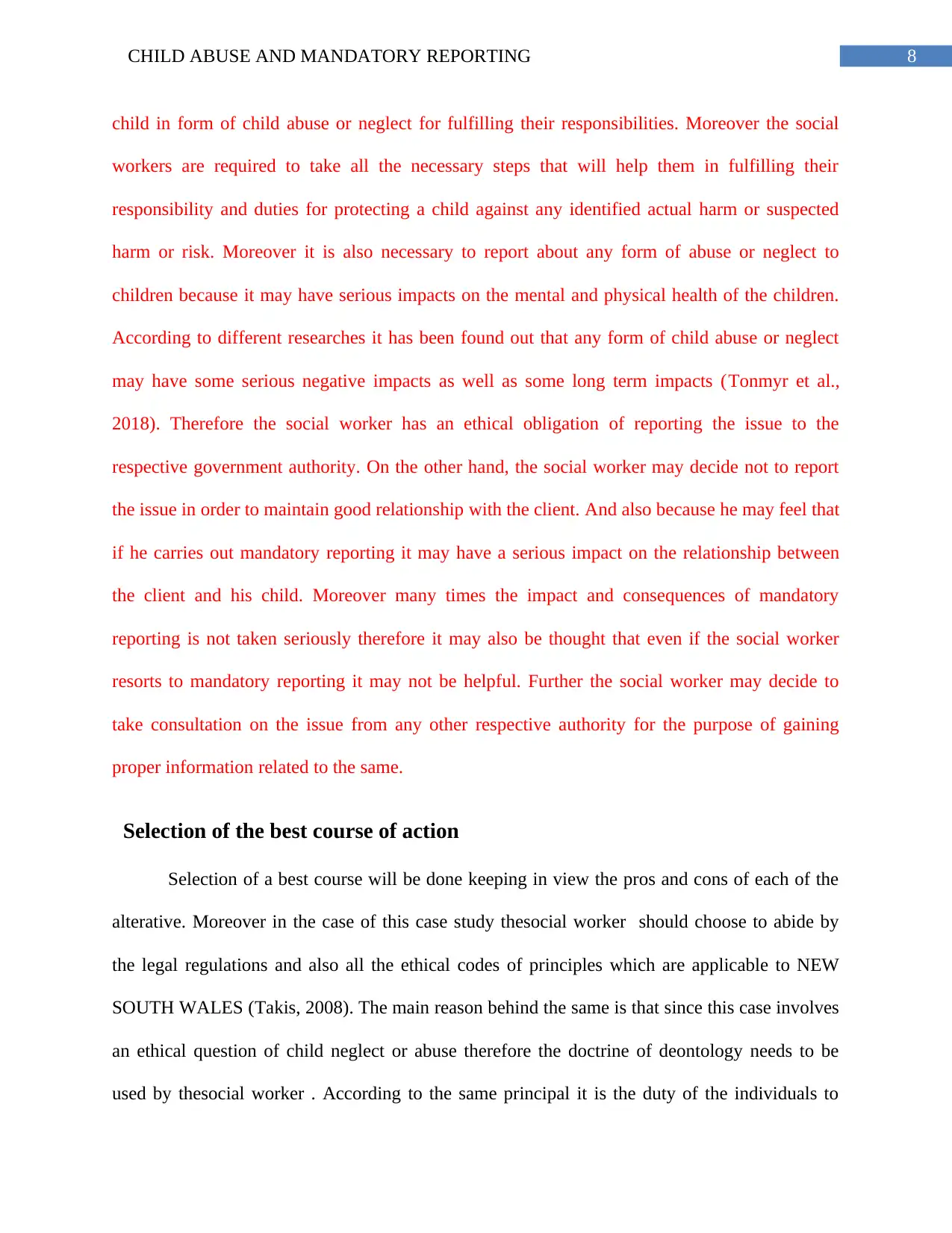
8CHILD ABUSE AND MANDATORY REPORTING
child in form of child abuse or neglect for fulfilling their responsibilities. Moreover the social
workers are required to take all the necessary steps that will help them in fulfilling their
responsibility and duties for protecting a child against any identified actual harm or suspected
harm or risk. Moreover it is also necessary to report about any form of abuse or neglect to
children because it may have serious impacts on the mental and physical health of the children.
According to different researches it has been found out that any form of child abuse or neglect
may have some serious negative impacts as well as some long term impacts (Tonmyr et al.,
2018). Therefore the social worker has an ethical obligation of reporting the issue to the
respective government authority. On the other hand, the social worker may decide not to report
the issue in order to maintain good relationship with the client. And also because he may feel that
if he carries out mandatory reporting it may have a serious impact on the relationship between
the client and his child. Moreover many times the impact and consequences of mandatory
reporting is not taken seriously therefore it may also be thought that even if the social worker
resorts to mandatory reporting it may not be helpful. Further the social worker may decide to
take consultation on the issue from any other respective authority for the purpose of gaining
proper information related to the same.
Selection of the best course of action
Selection of a best course will be done keeping in view the pros and cons of each of the
alterative. Moreover in the case of this case study thesocial worker should choose to abide by
the legal regulations and also all the ethical codes of principles which are applicable to NEW
SOUTH WALES (Takis, 2008). The main reason behind the same is that since this case involves
an ethical question of child neglect or abuse therefore the doctrine of deontology needs to be
used by thesocial worker . According to the same principal it is the duty of the individuals to
child in form of child abuse or neglect for fulfilling their responsibilities. Moreover the social
workers are required to take all the necessary steps that will help them in fulfilling their
responsibility and duties for protecting a child against any identified actual harm or suspected
harm or risk. Moreover it is also necessary to report about any form of abuse or neglect to
children because it may have serious impacts on the mental and physical health of the children.
According to different researches it has been found out that any form of child abuse or neglect
may have some serious negative impacts as well as some long term impacts (Tonmyr et al.,
2018). Therefore the social worker has an ethical obligation of reporting the issue to the
respective government authority. On the other hand, the social worker may decide not to report
the issue in order to maintain good relationship with the client. And also because he may feel that
if he carries out mandatory reporting it may have a serious impact on the relationship between
the client and his child. Moreover many times the impact and consequences of mandatory
reporting is not taken seriously therefore it may also be thought that even if the social worker
resorts to mandatory reporting it may not be helpful. Further the social worker may decide to
take consultation on the issue from any other respective authority for the purpose of gaining
proper information related to the same.
Selection of the best course of action
Selection of a best course will be done keeping in view the pros and cons of each of the
alterative. Moreover in the case of this case study thesocial worker should choose to abide by
the legal regulations and also all the ethical codes of principles which are applicable to NEW
SOUTH WALES (Takis, 2008). The main reason behind the same is that since this case involves
an ethical question of child neglect or abuse therefore the doctrine of deontology needs to be
used by thesocial worker . According to the same principal it is the duty of the individuals to
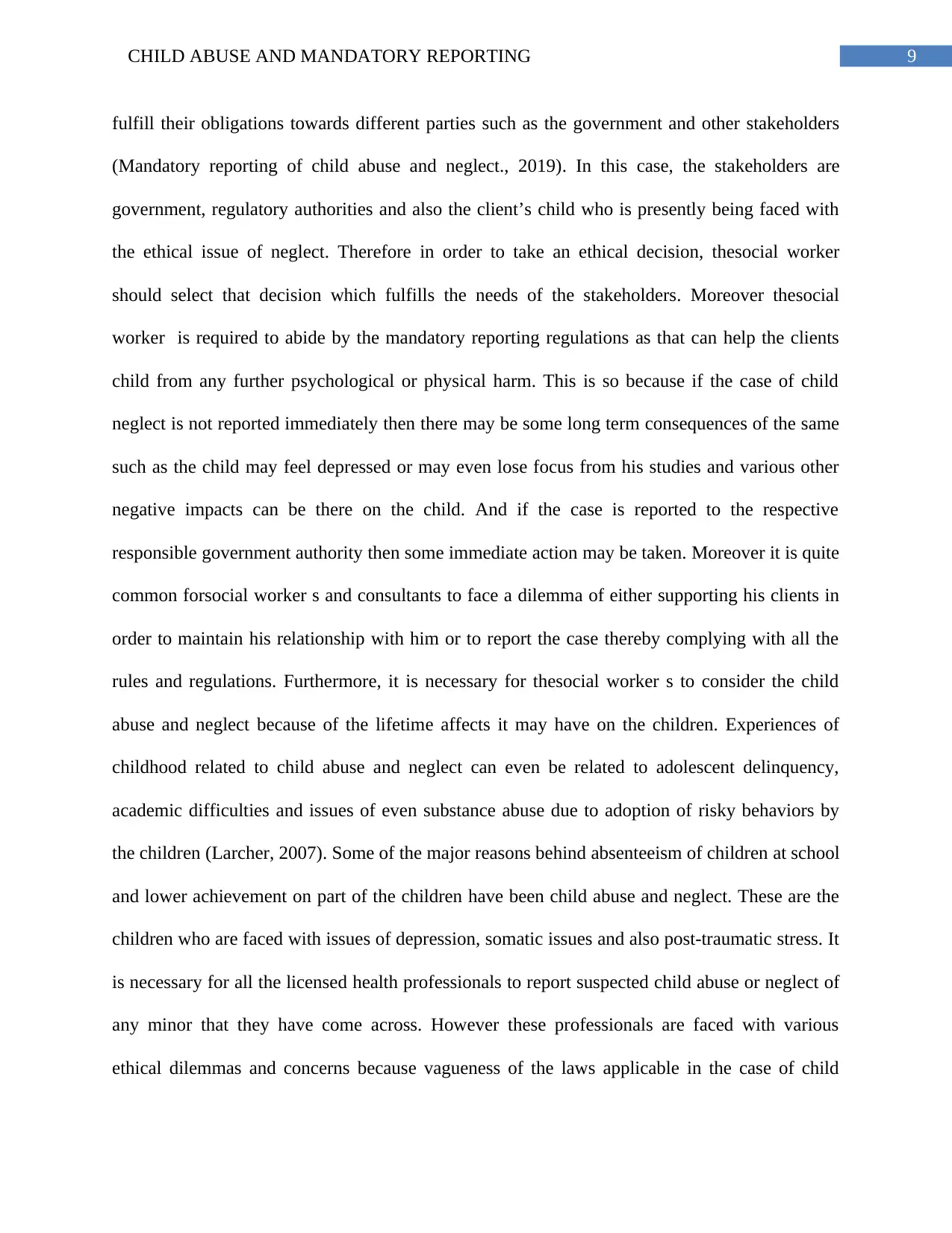
9CHILD ABUSE AND MANDATORY REPORTING
fulfill their obligations towards different parties such as the government and other stakeholders
(Mandatory reporting of child abuse and neglect., 2019). In this case, the stakeholders are
government, regulatory authorities and also the client’s child who is presently being faced with
the ethical issue of neglect. Therefore in order to take an ethical decision, thesocial worker
should select that decision which fulfills the needs of the stakeholders. Moreover thesocial
worker is required to abide by the mandatory reporting regulations as that can help the clients
child from any further psychological or physical harm. This is so because if the case of child
neglect is not reported immediately then there may be some long term consequences of the same
such as the child may feel depressed or may even lose focus from his studies and various other
negative impacts can be there on the child. And if the case is reported to the respective
responsible government authority then some immediate action may be taken. Moreover it is quite
common forsocial worker s and consultants to face a dilemma of either supporting his clients in
order to maintain his relationship with him or to report the case thereby complying with all the
rules and regulations. Furthermore, it is necessary for thesocial worker s to consider the child
abuse and neglect because of the lifetime affects it may have on the children. Experiences of
childhood related to child abuse and neglect can even be related to adolescent delinquency,
academic difficulties and issues of even substance abuse due to adoption of risky behaviors by
the children (Larcher, 2007). Some of the major reasons behind absenteeism of children at school
and lower achievement on part of the children have been child abuse and neglect. These are the
children who are faced with issues of depression, somatic issues and also post-traumatic stress. It
is necessary for all the licensed health professionals to report suspected child abuse or neglect of
any minor that they have come across. However these professionals are faced with various
ethical dilemmas and concerns because vagueness of the laws applicable in the case of child
fulfill their obligations towards different parties such as the government and other stakeholders
(Mandatory reporting of child abuse and neglect., 2019). In this case, the stakeholders are
government, regulatory authorities and also the client’s child who is presently being faced with
the ethical issue of neglect. Therefore in order to take an ethical decision, thesocial worker
should select that decision which fulfills the needs of the stakeholders. Moreover thesocial
worker is required to abide by the mandatory reporting regulations as that can help the clients
child from any further psychological or physical harm. This is so because if the case of child
neglect is not reported immediately then there may be some long term consequences of the same
such as the child may feel depressed or may even lose focus from his studies and various other
negative impacts can be there on the child. And if the case is reported to the respective
responsible government authority then some immediate action may be taken. Moreover it is quite
common forsocial worker s and consultants to face a dilemma of either supporting his clients in
order to maintain his relationship with him or to report the case thereby complying with all the
rules and regulations. Furthermore, it is necessary for thesocial worker s to consider the child
abuse and neglect because of the lifetime affects it may have on the children. Experiences of
childhood related to child abuse and neglect can even be related to adolescent delinquency,
academic difficulties and issues of even substance abuse due to adoption of risky behaviors by
the children (Larcher, 2007). Some of the major reasons behind absenteeism of children at school
and lower achievement on part of the children have been child abuse and neglect. These are the
children who are faced with issues of depression, somatic issues and also post-traumatic stress. It
is necessary for all the licensed health professionals to report suspected child abuse or neglect of
any minor that they have come across. However these professionals are faced with various
ethical dilemmas and concerns because vagueness of the laws applicable in the case of child
Secure Best Marks with AI Grader
Need help grading? Try our AI Grader for instant feedback on your assignments.
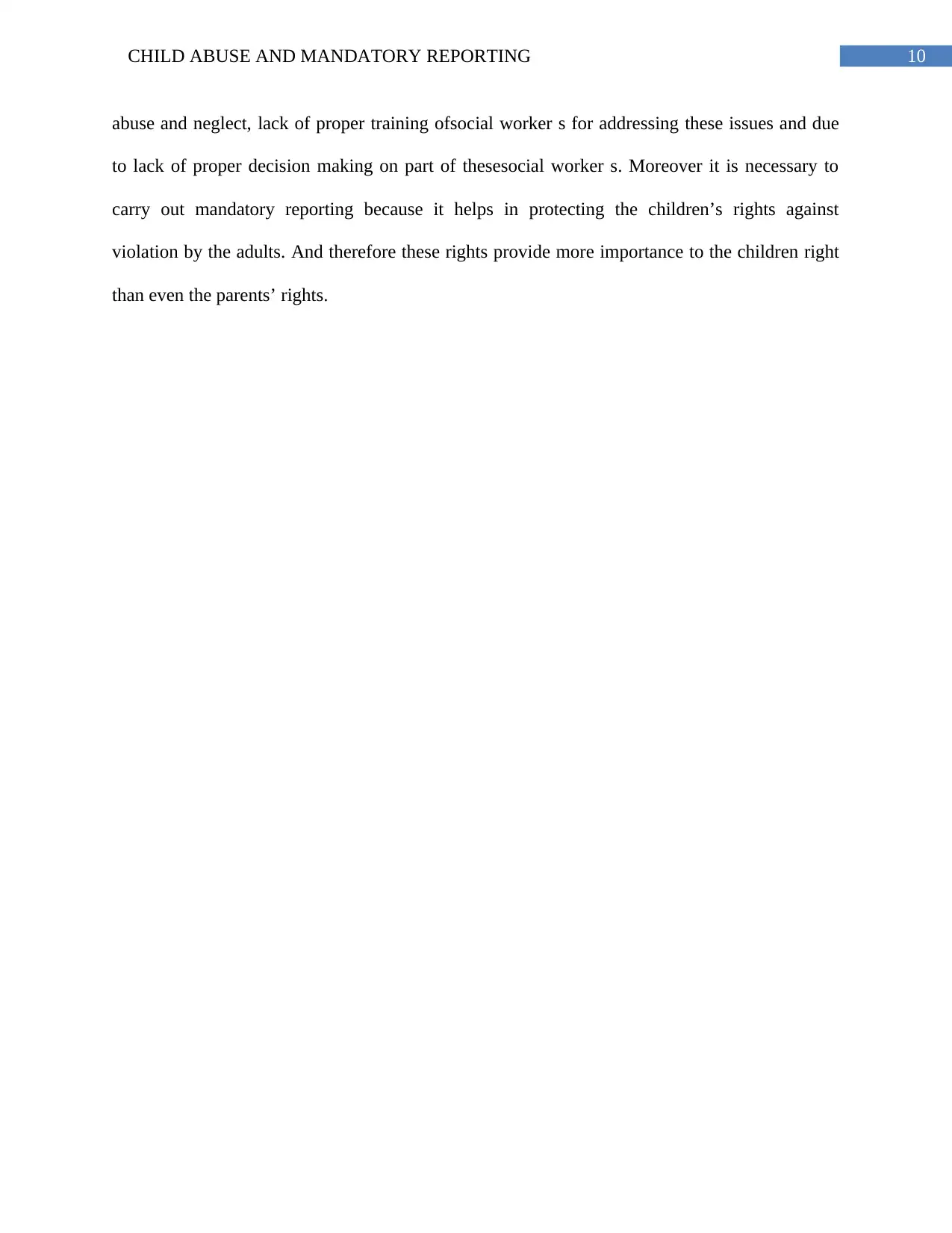
10CHILD ABUSE AND MANDATORY REPORTING
abuse and neglect, lack of proper training ofsocial worker s for addressing these issues and due
to lack of proper decision making on part of thesesocial worker s. Moreover it is necessary to
carry out mandatory reporting because it helps in protecting the children’s rights against
violation by the adults. And therefore these rights provide more importance to the children right
than even the parents’ rights.
abuse and neglect, lack of proper training ofsocial worker s for addressing these issues and due
to lack of proper decision making on part of thesesocial worker s. Moreover it is necessary to
carry out mandatory reporting because it helps in protecting the children’s rights against
violation by the adults. And therefore these rights provide more importance to the children right
than even the parents’ rights.
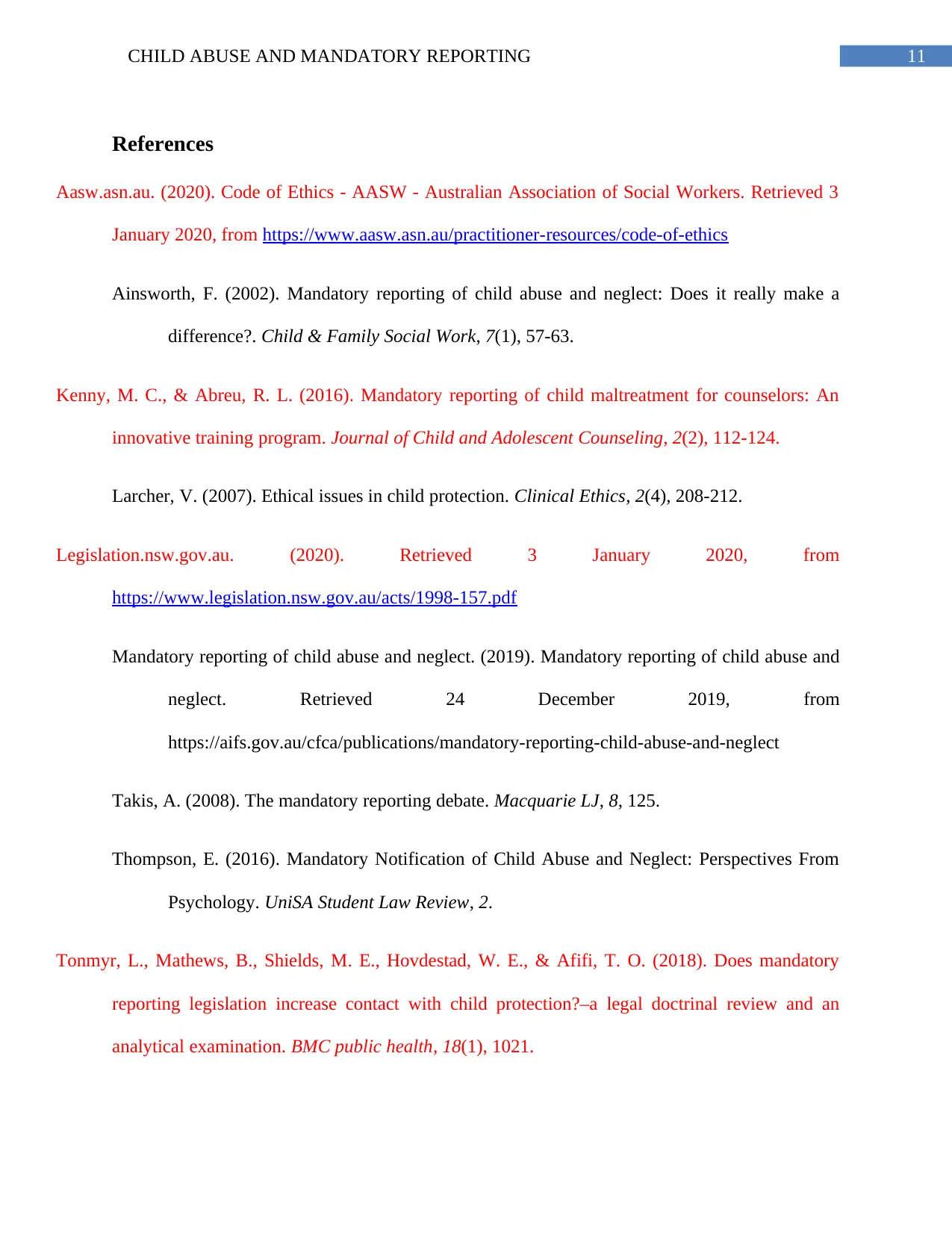
11CHILD ABUSE AND MANDATORY REPORTING
References
Aasw.asn.au. (2020). Code of Ethics - AASW - Australian Association of Social Workers. Retrieved 3
January 2020, from https://www.aasw.asn.au/practitioner-resources/code-of-ethics
Ainsworth, F. (2002). Mandatory reporting of child abuse and neglect: Does it really make a
difference?. Child & Family Social Work, 7(1), 57-63.
Kenny, M. C., & Abreu, R. L. (2016). Mandatory reporting of child maltreatment for counselors: An
innovative training program. Journal of Child and Adolescent Counseling, 2(2), 112-124.
Larcher, V. (2007). Ethical issues in child protection. Clinical Ethics, 2(4), 208-212.
Legislation.nsw.gov.au. (2020). Retrieved 3 January 2020, from
https://www.legislation.nsw.gov.au/acts/1998-157.pdf
Mandatory reporting of child abuse and neglect. (2019). Mandatory reporting of child abuse and
neglect. Retrieved 24 December 2019, from
https://aifs.gov.au/cfca/publications/mandatory-reporting-child-abuse-and-neglect
Takis, A. (2008). The mandatory reporting debate. Macquarie LJ, 8, 125.
Thompson, E. (2016). Mandatory Notification of Child Abuse and Neglect: Perspectives From
Psychology. UniSA Student Law Review, 2.
Tonmyr, L., Mathews, B., Shields, M. E., Hovdestad, W. E., & Afifi, T. O. (2018). Does mandatory
reporting legislation increase contact with child protection?–a legal doctrinal review and an
analytical examination. BMC public health, 18(1), 1021.
References
Aasw.asn.au. (2020). Code of Ethics - AASW - Australian Association of Social Workers. Retrieved 3
January 2020, from https://www.aasw.asn.au/practitioner-resources/code-of-ethics
Ainsworth, F. (2002). Mandatory reporting of child abuse and neglect: Does it really make a
difference?. Child & Family Social Work, 7(1), 57-63.
Kenny, M. C., & Abreu, R. L. (2016). Mandatory reporting of child maltreatment for counselors: An
innovative training program. Journal of Child and Adolescent Counseling, 2(2), 112-124.
Larcher, V. (2007). Ethical issues in child protection. Clinical Ethics, 2(4), 208-212.
Legislation.nsw.gov.au. (2020). Retrieved 3 January 2020, from
https://www.legislation.nsw.gov.au/acts/1998-157.pdf
Mandatory reporting of child abuse and neglect. (2019). Mandatory reporting of child abuse and
neglect. Retrieved 24 December 2019, from
https://aifs.gov.au/cfca/publications/mandatory-reporting-child-abuse-and-neglect
Takis, A. (2008). The mandatory reporting debate. Macquarie LJ, 8, 125.
Thompson, E. (2016). Mandatory Notification of Child Abuse and Neglect: Perspectives From
Psychology. UniSA Student Law Review, 2.
Tonmyr, L., Mathews, B., Shields, M. E., Hovdestad, W. E., & Afifi, T. O. (2018). Does mandatory
reporting legislation increase contact with child protection?–a legal doctrinal review and an
analytical examination. BMC public health, 18(1), 1021.
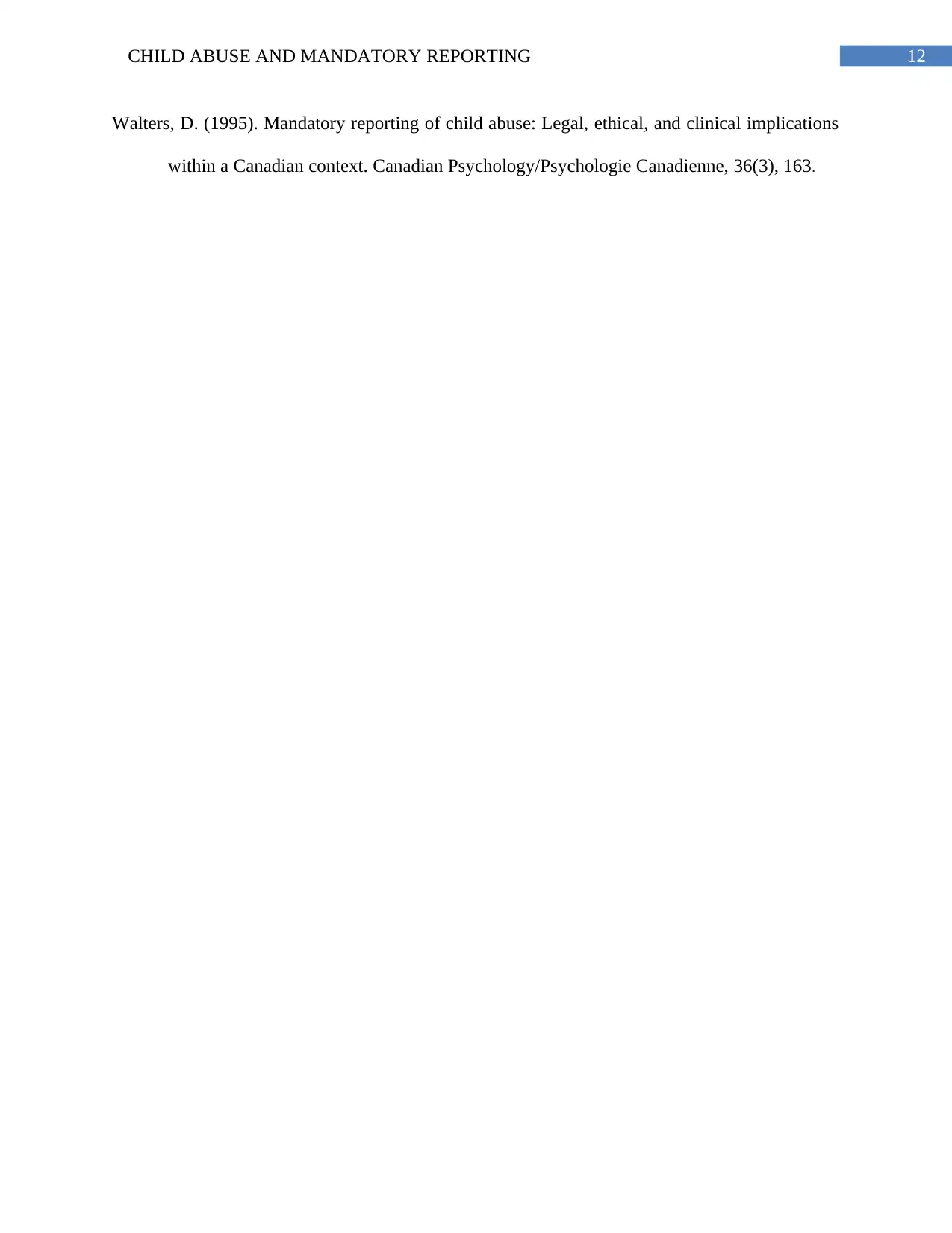
12CHILD ABUSE AND MANDATORY REPORTING
Walters, D. (1995). Mandatory reporting of child abuse: Legal, ethical, and clinical implications
within a Canadian context. Canadian Psychology/Psychologie Canadienne, 36(3), 163.
Walters, D. (1995). Mandatory reporting of child abuse: Legal, ethical, and clinical implications
within a Canadian context. Canadian Psychology/Psychologie Canadienne, 36(3), 163.
1 out of 13
Your All-in-One AI-Powered Toolkit for Academic Success.
+13062052269
info@desklib.com
Available 24*7 on WhatsApp / Email
![[object Object]](/_next/static/media/star-bottom.7253800d.svg)
Unlock your academic potential
© 2024 | Zucol Services PVT LTD | All rights reserved.





